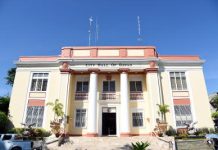The Grassroots Innovation for Inclusive Development (GRIND) Innovation Workbook of the Department of Science and Technology (DOST) XI has started its initial phase of implementation, which aspires to equip and empower 120 grassroots innovators in Davao Region.
The GRIND Innovation Workbook, a brainchild of the University of Southeastern Philippines (USeP) under the leadership of Dr. Karl P. Campos, provides the grassroots innovators “with a platform to express and articulate their innovative ideas effectively and facilitate a seamless collaboration with developers to bring those ideas to fruition.”
It was developed in partnership with the United Nations Development Program–Philippines (UNDP-PH) through the Climate Ace Project.
As part of the initial implementation, 10 grassroots innovators from Davao del Sur engaged in a simulation activity in February this year, where they actively participated in collaborative discussions, series of activities, and workshops to test the workbook for final revision and deployment.
“The valuable insights and suggestions of grassroots innovators are integral to shaping the GRIND workbook. This activity reaffirms our commitment to cultivate a vibrant ecosystem that nurtures and supports local innovators for more inclusive and sustainable development in the region,” said Howell Adrian Ong, DOST GRIND unit section head.
Ong, who led the GRIND technical working team in facilitating the simulation activity, said that the workbook consists of multiple lessons from idea generation, product and process development, protection, and commercialization.
“This workbook is designed to help individuals in marginalized communities by guiding them through their innovative journey,” he said.
He added that it was crafted using the Analysis, Design, Develop, Implement, and Evaluate (ADDIE) model and underwent repetitive development phases, allowing for constant improvements and modifications.
Ong explained that it would take four to six months for a grassroots innovator to complete the lessons from the entire workbook.
However, it would still depend on the interest and assessed needs of the individuals. “They can skip other lessons if they don’t need them anymore,” he said.
After taking the lessons from the workbook, the participants are expected to generate their own products, as they have already undergone idea generation and product and process development such as prototyping and fabrication; product quality management; and branding, packaging, and labeling.
The grassroots innovators shall also learn about intellectual property submission and business registration.
Based on the needs’ assessment in the communities, Ong said that the participants can create various products like food, clothing, and tribal costumes.
Once finalized, the workbook is expected to be deployed to other regions through the GRIND program, starting in the second quarter of 2024. (CLC/PIA Davao)






